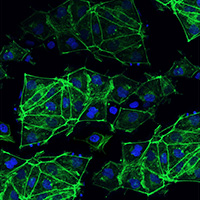Induced pluripotent stem (iPS) cells are generated by reprogramming a differentiated somatic cell into a pluripotent stem cell. This source of pluripotent cells enables drug discovery and disease modeling, and ultimately gives us a chance to find cures for today’s most devastating diseases. With iPS cells, researchers can generate patient- or disease-specific cells, enabling new frontiers in disease modeling (Meissner, Wernig, and Jaenisch 2007).
Although there are several methods for reprogramming cells, the Sendai virus method was shown to be highly reliable and efficient in comparison to other non-integrating methods (Schlaeger et al. 2015). The most commonly used reprogramming factors are the Yamanaka factors, Oct3/4, Sox2, c-Myc, and Klf4, which are suitable for efficient reprogramming (Takahashi et al. 2007).
The Cellartis DEF-CS 500 Culture System promotes reliable growth of hiPS cells in a defined, feeder-free environment. Cells are grown as a homogeneous monolayer and are enzymatically passaged as single cells that maintain pluripotency with a stable karyotype for more than 20 passages (Asplund et al. 2016). Here we show that the Cellartis DEF-CS 500 Culture System efficiently and robustly reprograms human fibroblasts using Sendai virus, in a 21-day protocol (Figure 1).

Figure 1. Reprogramming timeline with the Cellartis DEF-CS 500 Culture System.






